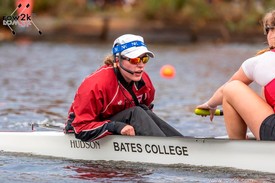Ed Moran, row2k.com

A proposed increase to the youth lightweight boy's limit that was recently passed and then rescinded by the USRowing Board has fueled debate across the country that could have significant impact on the future of junior weight category rowing in the US.
The proposal to form the study group was already under discussion and up for approval, but the vote taken by the USRowing Board of Directors at the association's annual meeting to raise the boy's weight limit from 150 to160 - a vote that was then rescinded in a special meeting Sunday night following a week of input from the rowing community - has placed heightened focus on youth lightweight rowing.
The vote to increase the boy's weight rule was largely criticized as unfair to programs already preparing lightweight crews for spring racing in 2018, but the issue gave renewed voice to those who believe lightweight rowing to be a health risk to young athletes. And while the weight change rule affected only boys, the task force will be examining lightweight rowing for both girls and boys.
Next week, USRowing is expected to announce the formation of a study task force that will focus on safety, and fairness concerns that surround youth lightweight rowing, and one outcome could be complete elimination of junior weight class rowing after the 2018 academic season.

"It's a complicated topic," said USRowing Chief Executive Officer Patrick McNerney. "But I can see that, with the proper guidelines, there is a scenario where (lightweight categories) can be included in youth rowing events. From a broader perspective, there is a potential for age tiers, but there is a tension between what we do at the high school level and what we do at the club level."
"These issues predate me, and have been around for a while," said McNerney, adding he was now in the process forming the group and hopes to forward the names of possible members for board approval by next week.
"I am in the process of putting together a list of names that were proposed to me and I am sending them out to the board. Over the next few days, we will be making a series of calls to those proposed and I will make a recommendation as to who is on the task force," McNerney said.
The task force will begin work in January and is expected to make recommendations for implementation, possibly following the 2018 sprints season. Whatever the task force recommends, "if there is going to be a change, we want to be sensitive to the academic calendars," McNerney said.
Following the Sunday evening special board meeting, and vote to retain the current weight limit, row2k contacted several boys youth coaches around the country to gauge their opinions about lightweight rowing, and found that those coaches who favor lightweight rowing felt elimination would reduce racing opportunities for kids who want to row, but are not big enough to compete for a spot in a varsity heavyweight crew.
Those opposed said they felt lightweight categories are unhealthy and can be dangerous and point to the fact that, internationally, only the US has youth lightweight rowing. (The issue is also being debated in Canada, which continues to include youth lightweight categories. A proposed Rowing Canada rule change to eliminate junior lightweights was removed following objections recently raised by the Canadian Secondary School Rowing Association.)
"My overall feeling on this matter is about safety," said Malvern Prep head coach Craig Hoffman. "It's not just about winning races and giving kids opportunity. Most of the rest of the world doesn't have lightweight junior rowing. They recognize the health risks."

"I have seen the weights move from 145 to 150 to 155 to 160 and back down to 150, all within the last 30 years," Hoffman said. "My sense is, at this point, to be aligned with the rest of the world, there should be no more lightweights at the junior level."
At Community Rowing Inc., boy's head coach Will Congram said the Boston based club has long considered eliminating lightweight rowing. "I'm certainly of the belief that, developmentally, it just doesn’t make sense to have lightweight rowing, period.
"I'm sort of confused as to why we wouldn’t follow what the rest of the world is doing and what FISA recommends," he said. "It just really doesn’t make sense to me beyond just maybe a loss in the number of events at youth nationals and this notion that we need more competitive opportunities for kids.

"I'm in the U15, U17, U19 camp," Congram said. "It's tough, and there will certainly be a change in the number of athletes across the country that can compete at Youth Nationals, and that would be painful. But I really would be happy to see them be done with lightweight rowing, period.
"I just don't think any high school athlete should be thinking about (cutting weight to row.) It's not healthy for a growing child to be limiting their caloric intake when they are trying to train and learn in school and handle all of things they are managing to begin with. To go about depriving themselves and their bodies of the calories they need is insane, and it's unhealthy."
While all of the coaches interviewed recognize the health issues involved, many program coaches believe lightweight rowing can be safely managed and that even with age specific categories, the opportunities to compete at the championship level will not exist for athletes who are under heavyweight size.
Yunian Cabrera Torres has been coaching a successful lightweight program at Belen Jesuit Prep in Miami, Florida. The Belen lightweight eight won the event at both the 2017 Scholastic Rowing Association of America Championships and the USRowing 2017 Youth National Championships.
Torres said that without lightweight rowing, Belen Jesuit would not have a competitive program. "Removing lightweight programs from the youth national championship will be a disaster to my program because the majority of my kids, 95 percent of my kids, are Latins who are no taller than six-feet and weigh between 145 pounds to 158 pounds.

"I have two or three kids that weigh 170 to 180 and that is all that I have. To me that would be the end of my program, because how can my kids be competitive at the level of Youth Nationals or Scholastic Nationals? They know that rowing against kids that weigh 180 pounds, they would not be able to win like they are doing right now. So, the motivation would be gone."
On the West Coast, where there are multiple, large, club rowing programs, lightweight rowing is very popular. Andrew Lennox served as the varsity boy's coach through the 2017 fall season and has coached the club's lightweight crews through several successful seasons, including victories at Youth Nationals.
"I definitely hear the health side of things, but I think that it can be done in a healthy kind of way," he said. "I think Marin has done it, and Oakland (Strokes) has done it, and other programs that have been successful on the lightweight side have all done a good job of managing a healthy way to make weight for the athletes.
"I would definitely hate to see lightweight rowing disappear because I think it provides those athletes with opportunities that, even if there was a four category or a JV category they might fit into or be successful in, it (lightweight rowing) provides opportunities," Lennox said.
While there are varied opinions about keeping or eliminating lightweight junior rowing, all the coaches interviewed said historic inconsistencies and frequent changes in weight limits have been problematic for both athletes and subscription to events for race organizers, and they are happy to see the subject addressed by a study task force.
"I think there are ways to do this, but it has not been really looked at before and that's what excites me about this group," said Bainbridge Island Rowing head coach Bruce Beall, who was a proponent for raising the weight limit to 160, and who submitted the original proposal to USRowing .
"When they dropped to 150 three years ago, suddenly in the Northwest region, both the lightweight four and the lightweight eights events went from having heats to being row-overs for seeding. They can't do a final only for USRowing national qualifiers. It's sort of silly, they row down the course and it doesn’t mean anything and it just seemed to me that the weight was too light.
"I talked to most of the coaches in the region and it seemed they felt that 150 was too light and had created a class of boys too big to make lightweight and not big enough to be heavyweight. What also happened, to me anyway, was we had guys who grew out of the weight limit. They were lightweights as juniors, but couldn’t make weight as seniors in a healthy way," he said.
"So, I'm really pleased that (USRowing) is going to do this. (McNerney) showed some real leadership and said let's really look at it once and for all, and clearly to look it for both men and women, and make a determination."
If you enjoy and rely on row2k, we need your help to be able to keep doing all this. Though row2k sometimes looks like a big, outside-funded operation, it mainly runs on enthusiasm and grit. Help us keep it coming, thank you! Learn more.
Comments | Log in to comment |
- Bont Rowing
- Calm Waters Rowing
- Concept 2
- Craftsbury Sculling
- The Crew Classic
- CrewLAB
- Croker
- Durham Boat Co.
- Empacher
- Faster Masters
- Filippi
- Fluidesign
- h2row.net
- HUDSON
- Live2Row Studios
- Nielsen-Kellerman
- Oak Ridge RA
- Peinert Boat Works
- Pocock Racing Shells
- Race1 USA
- RowKraft
- Rubini Jewelers
- Vespoli USA
- WinTech Racing
- Bont Rowing
- Calm Waters Rowing
- Concept 2
- Craftsbury Sculling
- The Crew Classic
- CrewLAB
- Croker
- Durham Boat Co.
- Empacher
- Faster Masters
- Filippi
- Fluidesign
- h2row.net
- HUDSON
- Live2Row Studios
- Nielsen-Kellerman
- Oak Ridge RA
- Peinert Boat Works
- Pocock Racing Shells
- Race1 USA
- RowKraft
- Rubini Jewelers
- Vespoli USA
- WinTech Racing


















12/25/2017 3:00:20 PM
Many sports have weight classes. This issue can be managed responsibly and positively for young athletes. For high school to college athletes rowing is so much safer compared to most popular sports with the risks of brain trauma, ruined knees, joints and broken bones.
At 15 I was told “best you turn out for the lightweight boat”. I did and 40yrs later I am still in love with this sport. I can’t imagine my life without rowing. Rowing should invite all that want to challenge themselves, compete and be part of a team.
12/20/2017 6:00:55 PM
12/20/2017 2:35:31 PM
12/20/2017 1:40:33 PM
12/20/2017 12:30:02 AM
Rowing is unique in this regard, so the sport could take advantage of this fact and avoid all the unhealthy & risky side effects inherent to weight cutting sports. Instead of a weight limit, there would be a height limit.
Problem solved. You're welcome (Maui voice).
I guess there are a few guys/gals out there who are at a disadvantage being tall and super skinny, but I'll go out on a limb and say that adding muscle is way healthier than cutting weight.
12/19/2017 10:31:50 PM
12/16/2017 3:23:35 PM
12/16/2017 12:57:15 PM
12/16/2017 12:35:35 PM
12/15/2017 12:49:07 PM
12/14/2017 6:58:47 PM